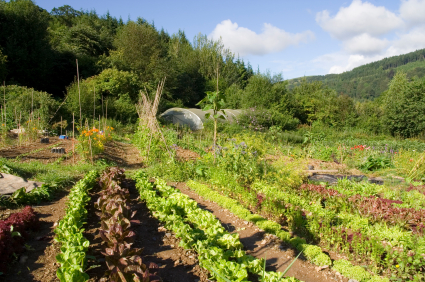Is organic farming productive enough to feed billions of people–or will it always be a yuppie niche in a food system increasingly dependent on agrichemicals, massive animal factories, synthetic fertilizers, and biotechnology?
Nina Fedoroff, the State Department’s chief technology adviser, propounds the latter view. A trained scientist with ties to the biotech industry, Fedoroff thinks organic is a fraud. (She attained her current positon during the Bush Adminsration in Condoleeza Rice’s State Department; Secretary Nina Fedoroff, with her previous employer. Clinton has elected to keep her on.) In a recent forum on biotech in Seed Magazine (in which I also participated), Hillary Clinton’s science czar had this to say:
Nina Fedoroff, with her previous employer. Clinton has elected to keep her on.) In a recent forum on biotech in Seed Magazine (in which I also participated), Hillary Clinton’s science czar had this to say:
Then there are the romantic agri-myths, like the “organic” one, which lots of people have bought into. It goes like this: Organic food, farmed using manure instead of chemicals, is better for you and better for the land. None of that’s true-nitrogen is nitrogen-but it’s pretty good marketing if you’re selling poor produce at exorbitant prices. (Organic farming is inefficient, so production costs are generally higher.)
I’ll leave aside for this post the “nitrogen is nitrogen” claim–whether synthetic nitrogen delivers the organic matter, micronutrient, or microbiological benefits to soil that compost and green manure do. (It’s sort of like debating whether consuming a balanced, diverse diet is any different from living on sugar water and vitamin pills. Oops–guess I couldn’t leave it aside.) Let’s focus on the value of organic–a key question for Fedoroff, since she will help shape U.S. foreign policy toward ag development in the global south.
She dismisses organic agriculture as a “myth”–an inefficient farming system that delivers “poor produce”: surely not something one should go around trying to “feed the world” with. And she does so with an air of “case closed”; she is, after all, a scientist, so whatever she says must be true.
Right? Nah. In fact, she’s using her high position in government as a megaphone to amplify and legitimize a bunch of industry-friendly nonsense. (The fact that she enjoys direct access to our top foreign-policy official should give us all pause.)
In fact, a paper (PDF) published in the peer-reviewed journal Renewable Agriculture and Food Systems by a bunch of University of Michigan ecologists cogently challenges Fedoroff’s view. They compare studies that gauge yields of organic and conventionally grown crops, and find that organic competes quite well. As a result, they conclude:
Our results suggest that organic methods of food production can contribute substantially to feeding the current an future human population on the current agricultural land base, while maintaining soil fertility.
Moreover, they indirectly address an old slur against organic promoted by Normon Borlaug, industrial agriculture’s greatest apologist. In a notorious 2000 interview with Reason Magazine, the great man declared that “if all agriculture were organic, you would have to increase cropland area dramatically, spreading out into marginal areas and cutting down millions of acres of forests.” That’s bunkum, according to the Michigan researchers. They write:
In fact, the models suggest the possibility that the agricultural land base could eventually be reduced if organic production methods were employed, although additional intensification via conventional methods in the tropics would have the same effect.
Crucially, the researchers acknowledge that a large-scale conversion to organic would be difficult–a fact that pro-organic enthusiasts often forget. They write: “In spite of our optimistic prognosis for organic agriculture, we recognize that the transition to and practice of organic agriculture contain numerous challenges-agronomically, economically, and educationally.”
And getting there would require serious government action:
The practice of organic agriculture on a large scale requires support from research institutions dedicated to agro-ecological methods of fertility and pest management, a strong extension system, and a committed public.
Let’s not forget, though, that our government for decades has been shoveling billions of dollars into subsidies and research for chemical ag–and paying little more than lip service to organic. Meanwhile, regulators have looked the other way while the food and industries consolidated into a few giant companies–ones that contribute lavishly to candidates and run well-funded lobbying operations. Fedoroff’s lofty position proves that they still wield plenty of power–let’s hope not sufficient power to make her vision of perpetual industrial-ag dominance self-fulfilling.



